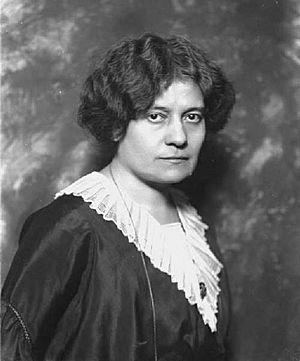Ada Negri facts for kids
Quick facts for kids
Ada Negri
|
|
|---|---|

Negri in 1913
|
|
| Born | 3 February 1870 |
| Died | 11 January 1945 (aged 74) Milan, Italy
|
| Nationality | Italian |
| Occupation | Poet |
Ada Negri (born February 3, 1870 – died January 11, 1945) was a famous Italian poet and writer. She was the only woman ever allowed to join the Academy of Italy, which was a very important group of thinkers and artists.
Contents
Biography: Ada Negri's Life Story
Ada Negri was born in Lodi, Italy, on February 3, 1870. Her father, Giuseppe Negri, worked as a coachman. Her mother, Vittoria Cornalba, was a weaver.
Ada spent a lot of time with her grandmother, Giuseppina "Peppina" Panni. Her grandmother worked as a caretaker at a grand palace. Ada often explored the palace alone, watching people pass by. She wrote about these childhood memories in her book Stella Mattutina (which means Morning Star).
Becoming a Teacher and Poet
Ada went to a special school in Lodi for girls. There, she earned a diploma to become an elementary school teacher. When she was eighteen, she started teaching in a small village called Motta Visconti, near the Ticino river in Pavia. Her teacher, Paolo Tedeschi, saw how smart and imaginative she was. He encouraged her to keep learning.
In Pavia, Ada lived in Palazzo Cornazzani. This building was also home to other famous people like Ugo Foscolo and Albert Einstein at different times. Her first collection of poems, called Fatalità (1892), made her well-known as a poet. Because of her success, she was given a teaching job at a school in Milan. Her second book of poems, Tempeste (1896), talked about the sad lives of poor people.
Family Life and Later Years
On March 28, 1896, Ada married Giovanni Garlanda. He was an industrialist from Biella who had fallen in love with her after reading her poetry. By 1904, they had two daughters, Bianca and Vittoria. Sadly, Vittoria died when she was a baby.
In 1913, Ada separated from her husband. She moved to Switzerland with her daughter Bianca. After that, she traveled a lot. She often visited Laglio on Lake Como. There, she wrote her only novel, Stella Mattutina. This book was about her own life. It was published in 1921 and later translated into English in 1930. In March 1923, Ada spent a long time on the island of Capri. While there, she wrote I canti dell'isola.
In 1940, Ada Negri became the first woman to join the Italian Academy. However, this honor later caused problems for her reputation. Members of the Academy had to promise loyalty to the Fascist government at the time. They also received special benefits from the government.
Ada Negri wrote for Lidel, a magazine for women published between 1919 and 1935. Her poems were translated into many languages. They appeared in newspapers in the U.S. and other countries.
Ada Negri passed away on January 11, 1945, in her studio in Milan. She was 74 years old. Her daughter Bianca found her.
The actress Pola Negri (whose real name was Barbara Apolonia Chałupec) chose her stage name "Negri" to honor Ada Negri. Another actress, Paola Pezzaglia, was known for performing Ada's poetry on stage.
Criticism: How People Saw Her Work
Some critics, like Benedetto Croce, thought Ada Negri's work was too simple and emotional. He felt her poems were often sad and focused on feelings. He even suggested that women's writing might be less perfect because of their "maternal instinct."
However, other critics had a different view. They believed Ada Negri focused on the difficulties of life in a unique way. They said her poems showed the struggles, sadness, and joys of many people during her time. These critics felt she broke away from old writing rules. They said her poems flowed freely, like the wind or water, and were very precise.
Ada Negri's work often reflected the unfairness she saw in life. She even refused to publish her last book of poems until World War II ended. After 1945, her reputation suffered because she had been associated with the Fascist movement. She had received the Mussolini Prize in 1931, which was funded by a newspaper called Corriere della Sera.
Works: Books by Ada Negri
Poetry Collections
- Fatalità (1892)
- Tempeste (1896)
- Maternità (1904)
- Dal profondo (1910)
- Esilio (1914)
- Il libro di Mara (1919)
- The Book of Mara, translated into English by Maria A. Costantini, Italica Press (2011)
- I canti dell’isola (1925)
- Songs of the Island, translated by Maria A. Costantini. Italica Press (2011)
- Vespertina (1930)
- Il dono (1936)
- Fons amoris (1946), published after her death
Prose Works (Stories and Essays)
- Le solitarie (1917)
- Orazioni (1918)
- Stella mattutina (1921)
- Morning Star, translated by Anne Day. Macmillan Co., (1930). Republished, Sublunary Editions (2021)
- Finestre alte (1923)
- Le strade (1926)
- Sorelle (1929)
- Di giorno in giorno (1932)
- Erba sul sagrato (1939)
- Oltre (1947) published after her death
See also
 In Spanish: Ada Negri para niños
In Spanish: Ada Negri para niños
 | John T. Biggers |
 | Thomas Blackshear |
 | Mark Bradford |
 | Beverly Buchanan |

